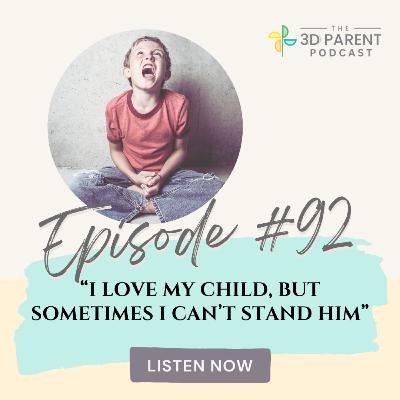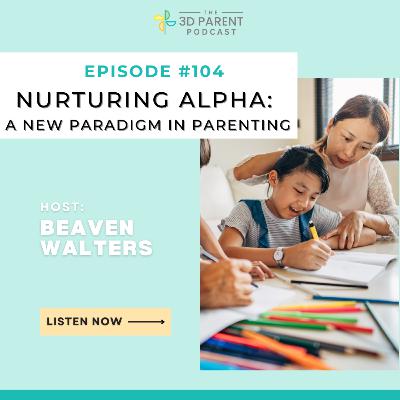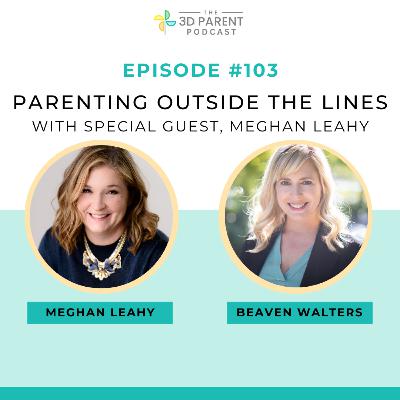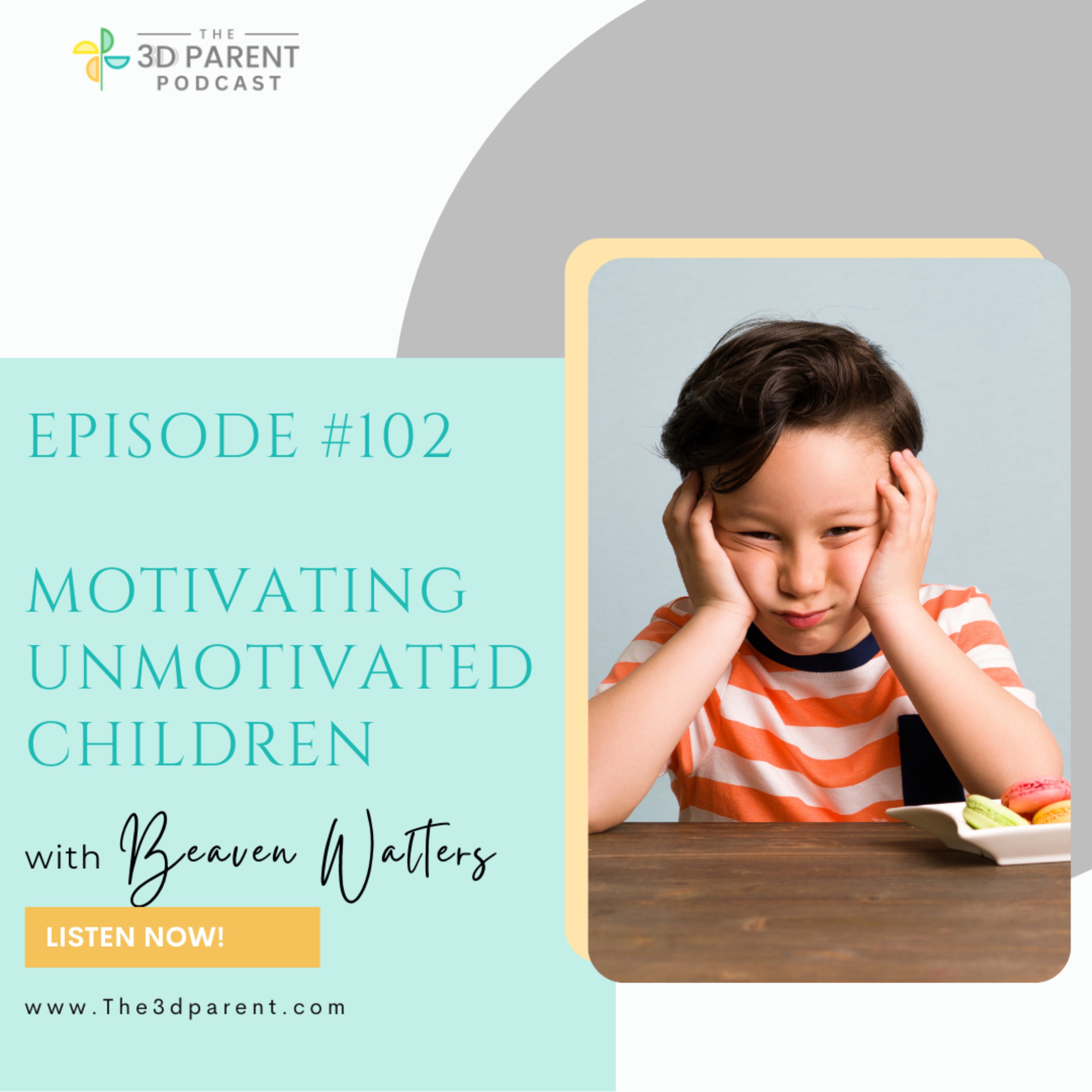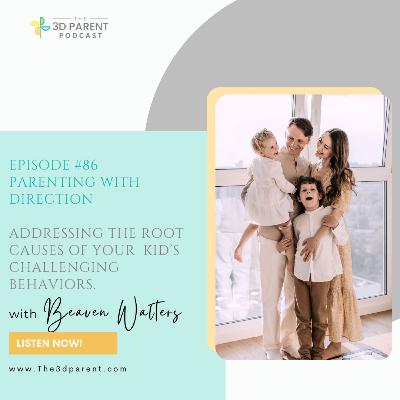#92: “I Love My Child, but Sometimes I Can’t Stand Him”
Description
DESCRIPTION:
Ever find yourself caught in the tug-of-war between absolute love for your child and the occasional, “I'm finding it impossible to deal with my child right now," moment? If so, you're not alone! Join me on Episode #92: “"I Love My Child, But Sometimes I Can't Stand Him," where we're diving headfirst into the candid realities of parenting a more challenging child.
Join me as we unpack:
- Understanding the "why" behind your child's behavior
- Move past resentment and embrace acceptance, creating a foundation for a more positive parent-child dynamic.
- Practical tips to let go of comparisons and celebrate your child's unique personality and strengths.
- "Discipline with Dignity" techniques that promote cooperation and mutual respect
This episode is for you if:
- You feel like you're constantly on edge with your child.
- You struggle with shame, guilt, and self-doubt about your parenting skills.
- You wish you could connect with your challenging child on a deeper level.
- You're looking for practical tools to manage your child’s frustrating behaviors.
Remember, you're a loving, resilient, and capable parent doing your best. With the appropriate support, self-compassion, and a growth mindset, you can overcome any challenge and cultivate the loving, connected relationship with your child that you aspire to. Tune into Episode #92 for a fresh perspective and practical support.
SHOWNOTES:
Ever find yourself grappling with conflicting emotions towards your child? It's an experience that many parents share but might hesitate to openly discuss.
Challenging children often exhibit attitudes that can be tough to handle. When a child's demeanor is sweet, calm, and affectionate, it's easy to embrace them, but what about those moments when their attitudes provoke unexpected emotions?
How do you open yourself up to connect with a child who may seem a bit more challenging to understand?
I get it. I've been there too. In fact, I used to be wracked with guilt every time I had those fleeting thoughts of frustration or impatience. But here's the thing – those thoughts don't make you a bad parent. They make you human. And as a parent coach, I've heard it time after time from other parents wrestling with similar feelings.
Various factors that contribute to a complex child's behavior
- Vulnerability to Love--A Prickly Defense Mechanism: Sometimes, challenging children present rough, prickly exteriors because they find love and connection too vulnerable. It's uncomfortable for them to be lovable and endearing, often due to a highly sensitive temperament or past hurts. Understanding this vulnerability is crucial in fostering a compassionate approach.
- Subconscious Self-Fulfilling Prophecy: Believing They Are Unlovable: In some cases, challenging children come to believe that they are unlovable. This belief becomes almost like a self-fulfilling prophecy, influencing their behavior and interactions with others which are often annoying, off-putting, or even mean spirited. As a parent, it's essential to consider your role in this dynamic – do your actions unintentionally contribute to their negative self-perception?
- Building Inner Narratives--Seeds in Formative Years and the Impact of Words and Actions: For a young child, the formative years are crucial in shaping their self-worth and self-esteem. The comments and feedback they receive, both at home and in their broader environment, contribute to the narrative they internalize. Consider the phrases you use when frustrated: "I don't want to be around you when you act like this" or "Why are you always so negative?" The impact of these words goes beyond the moment, shaping your child's sense-of-self. Reflecting on the language used by caregivers, teachers, peers, and siblings is equally important.
- Parental Grief--Facing your Sadness and Disappointment: If you are struggling to connect with your complex child and feel yourself wishing your child was different than they are, you probably experience a lot of resentment and shame. I want to help you make a shift away from these difficult feelings. The first step is acknowledging and normalizing your own parental grief. You might have envisioned your child and your experience as a parent being very different than it currently is. This disappointment is difficult to face and likely fills you with equal parts of resentment and guilt. The first and most crucial step is to forgive yourself for the feelings of disconnection with your child and acknowledge that it's okay to experience this grief in parenting a complex child. Let's recognize the importance of allowing ourselves to feel the sadness associated with the challenges we didn't anticipate.
How to move past Resentment and Towards Acceptance
- Acknowledging the Unforeseen Reality--Letting Go of Disappointment: As parents, none of us envisioned this reality when we dreamt of having children. The image we had in mind might have been different from the challenging child we are parenting. It's essential to find and feel the sadness around what is, letting go of the disappointment of not getting the child we imagined. Acknowledge the grief and adjust your vision to the reality of your unique and complex child.
- The Importance of Privacy--Processing Grief Away from Your Child: Acceptance also means learning to adjust to the reality of your child's temperament and challenges. Grieve the adjustments you need to make, whether it's opting out of certain activities or events because they might be too overwhelming for your child. Feeling sadness about what you're missing is valid, but it's crucial to keep this grief work away from your child. Avoid exposing your child to the emotions associated with these adjustments. Seek a trusted adult – your spouse, partner, friend, parenting coach, or therapist – to process these feelings with. This private space allows you to navigate the complexities of parenting a challenging child without burdening them with your emotional journey.
- Letting Go of Comparisons--A Key to Overcoming Resentment: Comparing your child to others, whether in your household or observed in your social circles, often leads to resentment. Dr. Brené Brown defines resentment as a feeling related to perceived unfairness or injustice, often stemming from hidden envy. Remember, as a parent, you cannot control who your child is. Let go of comparisons that only serve to amplify resentment and hinder your ability to connect with and accept your child.
- Understanding the Impact of Envy--Overcoming Resentment: Envy is a powerful emotion that fuels resentment. When we envy the perceived ease of other parents' experiences, it deepens our frustration and resentment towards our own parenting journey. Acknowledge that your child is unique, and comparisons only serve to magnify a sense of unfairness. Embrace the reality that your child is an individual with their own set of challenges and gifts, and your journey is incomparable to others.
How to Grow Your Acceptance Instead of Your Resentment
- Embrace Your Child's Uniqueness: First and foremost, recognize that your child's challenges are not a reflection of you. Let go of the fantasies you held about who your child should be and grow alongside them. Invest time in getting to know your child deeply. The more you focus on understanding them, the more you'll uncover their wonderful and unique gifts.
- Cultivate Curiosity and Let Go of Unrealistic Expectations: Become genuinely curious about your child. Release unfair expectations that might have clouded your perception. Your child possesses numerous positive attributes; seek them out, elevate them, and express your observations to your child. This fosters a sense of gratitude for the incredible individual they are.
- Practice a Gratitude Parenting Routine: Commit to a daily gratitude practice in parenting. Reflect on the lovable aspects of your child, even if you find it challenging initially. Create a space for positivity by acknowledging and appreciating their unique qualities. Consider implementing a gratitude journal or daily reflection to reinforce this practice.
- <str

